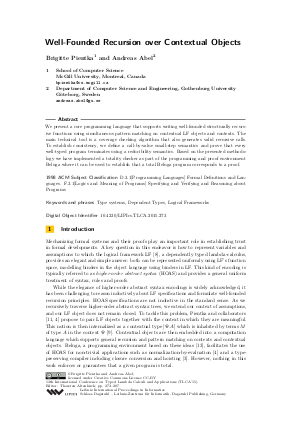Well-Founded Recursion over Contextual Objects
Authors Brigitte Pientka, Andreas Abel
-
Part of:
Volume:
13th International Conference on Typed Lambda Calculi and Applications (TLCA 2015)
Part of: Series: Leibniz International Proceedings in Informatics (LIPIcs)
Part of: Conference: International Conference on Typed Lambda Calculi and Applications (TLCA) - License:
 Creative Commons Attribution 3.0 Unported license
Creative Commons Attribution 3.0 Unported license
- Publication Date: 2015-06-15
File

PDF
LIPIcs.TLCA.2015.273.pdf
- Filesize: 0.52 MB
- 15 pages
Document Identifiers
Subject Classification
Keywords
- Type systems
- Dependent Types
- Logical Frameworks
Metrics
- Access Statistics
-
Total Accesses (updated on a weekly basis)
0PDF Downloads0Metadata Views
Abstract
We present a core programming language that supports writing well-founded structurally recursive functions using simultaneous pattern matching on contextual LF objects and contexts. The main technical tool is a coverage checking algorithm that also generates valid recursive calls. To establish consistency, we define a call-by-value small-step semantics and prove that every well-typed program terminates using a reducibility semantics. Based on the presented methodology we have implemented a totality checker as part of the programming and proof environment Beluga where it can be used to establish that a total Beluga program corresponds to a proof.
Cite As Get BibTex
Brigitte Pientka and Andreas Abel. Well-Founded Recursion over Contextual Objects. In 13th International Conference on Typed Lambda Calculi and Applications (TLCA 2015). Leibniz International Proceedings in Informatics (LIPIcs), Volume 38, pp. 273-287, Schloss Dagstuhl – Leibniz-Zentrum für Informatik (2015)
https://doi.org/10.4230/LIPIcs.TLCA.2015.273
BibTex
@InProceedings{pientka_et_al:LIPIcs.TLCA.2015.273,
author = {Pientka, Brigitte and Abel, Andreas},
title = {{Well-Founded Recursion over Contextual Objects}},
booktitle = {13th International Conference on Typed Lambda Calculi and Applications (TLCA 2015)},
pages = {273--287},
series = {Leibniz International Proceedings in Informatics (LIPIcs)},
ISBN = {978-3-939897-87-3},
ISSN = {1868-8969},
year = {2015},
volume = {38},
editor = {Altenkirch, Thorsten},
publisher = {Schloss Dagstuhl -- Leibniz-Zentrum f{\"u}r Informatik},
address = {Dagstuhl, Germany},
URL = {https://drops.dagstuhl.de/entities/document/10.4230/LIPIcs.TLCA.2015.273},
URN = {urn:nbn:de:0030-drops-51699},
doi = {10.4230/LIPIcs.TLCA.2015.273},
annote = {Keywords: Type systems, Dependent Types, Logical Frameworks}
}
Author Details
References
-
Andreas Abel. Tutch User’s Guide. Carnegie-Mellon University, Pittsburgh, PA, 2002. Section 7.1: Proof terms for structural recursion.

-
Andreas Abel and Brigitte Pientka. Higher-order dynamic pattern unification for dependent types and records. In TLCA'11, volume 6690 of LNCS, pages 10-26. Springer, 2011.

-
Olivier Savary Belanger, Stefan Monnier, and Brigitte Pientka. Programming type-safe transformations using higher-order abstract syntax. In CPP'13, volume 8307 of LNCS, pages 243-258. Springer, 2013.

-
Andrew Cave and Brigitte Pientka. Programming with binders and indexed data-types. In POPL'12, pages 413-424. ACM, 2012.

-
Joshua Dunfield and Brigitte Pientka. Case analysis of higher-order data. ENTCS, 228:69-84, 2009.

-
Francisco Ferreira and Brigitte Pientka. Bidirectional elaboration of dependently typed languages. In PPDP'14. ACM, 2014.

-
Andrew Gacek, Dale Miller, and Gopalan Nadathur. Combining generic judgments with recursive definitions. In LICS'08, pages 33-44. IEEE CS Press, 2008.

-
Robert Harper, Furio Honsell, and Gordon Plotkin. A framework for defining logics. JACM, 40(1):143-184, 1993.

-
Aleksandar Nanevski, Frank Pfenning, and Brigitte Pientka. Contextual modal type theory. ACM TOCL, 9(3):1-49, 2008.

-
Brigitte Pientka. Verifying termination and reduction properties about higher-order logic programs. JAR, 34(2):179-207, 2005.

-
Brigitte Pientka. A type-theoretic foundation for programming with higher-order abstract syntax and first-class substitutions. In POPL'08, pages 371-382. ACM, 2008.

-
Brigitte Pientka. An insider’s look at LF type reconstruction: Everything you (n)ever wanted to know. JFP, 1(1-37), 2013.

-
Brigitte Pientka and Joshua Dunfield. Beluga: A framework for programming and reasoning with deductive systems (system description). In IJCAR'10, volume 6173 of LNCS, pages 15-21. Springer, 2010.

-
Andrew Pitts. Nominal logic, a first order theory of names and binding. Inf. Comput., 186(2):165-193, 2003.

-
Carsten Schürmann. Automating the Meta Theory of Deductive Systems. PhD thesis, Department of Computer Science, Carnegie Mellon University, 2000. CMU-CS-00-146.

-
Carsten Schürmann, Joëlle Despeyroux, and Frank Pfenning. Primitive recursion for higher-order abstract syntax. TCS, 266(1-2):1-57, 2001.

-
Carsten Schürmann and Frank Pfenning. A coverage checking algorithm for LF. In TPHOLS'03, volume 2758 of LNCS, pages 120-135, Rome, Italy, 2003. Springer.

-
Alwen Tiu and Alberto Momigliano. Cut elimination for a logic with induction and co-induction. J. Applied Logic, 10(4):330-367, 2012.

-
Roberto Virga. Higher-Order Rewriting with Dependent Types. PhD thesis, Department of Mathematical Sciences, Carnegie Mellon University, 1999. CMU-CS-99-167.

-
Kevin Watkins, Iliano Cervesato, Frank Pfenning, and David Walker. A concurrent logical framework I: Judgements and properties. Technical report, School of Computer Science, Carnegie Mellon University, Pittsburgh, 2003.

-
Hongwei Xi. Dependent types for program termination verification. HOSC, 15(1):91-131, 2002.

